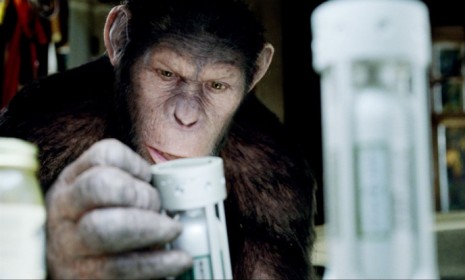Could a Planet of the Apes-style revolt actually happen?
Some scientists are alarmed by experiments combining animal cells with human DNA and stem cells

A free daily email with the biggest news stories of the day – and the best features from TheWeek.com
You are now subscribed
Your newsletter sign-up was successful
In the new movie Rise of the Planet of the Apes, scientists working on a cure for Alzheimer's disease fiddle with the brains of chimpanzees, inadvertently creating a new breed of ape with human-like intelligence — and very aggressive tendencies. Now, a real-life group of British scientists is warning that unregulated experimentation on animals could someday create just that kind of scenario, with equally disastrous consequences. Here's what you need to know:
What kind of research is being conducted now?
It's at a much simpler level than what's usually shown in sci-fi movies. For example, U.S. scientists have implanted human embryonic stem cells — which can develop into any part of the human body — into mouse embryos. Though the embryos' mouse cells quickly outgrew the human stem cells, a tiny portion of the embryos retained their human cells. Last year, millions of experiments were performed using genetically modified animals like fish and mice who carried some human DNA.
The Week
Escape your echo chamber. Get the facts behind the news, plus analysis from multiple perspectives.

Sign up for The Week's Free Newsletters
From our morning news briefing to a weekly Good News Newsletter, get the best of The Week delivered directly to your inbox.
From our morning news briefing to a weekly Good News Newsletter, get the best of The Week delivered directly to your inbox.
Is that kind of research ethical?
Not according to some critics. Among the millions of experiments in this field, it was recently revealed that more than 150 hybrid human-animal embryos have been created in British laboratories. Some used animal eggs that were fertilized by human sperm, while others were so-called "chimeras," in which human cells are mixed with animal embryos. "Ethically, it can never be justifiable — it is dabbling in the grotesque," says U.K. parliamentarian Lord Alton, as quoted by Britain's Daily Mail. "At every stage the justification from scientists has been: 'If only you allow us to do this, we will find cures for every illness known to mankind.' This is emotional blackmail."
What are scientists worried about?
They're concerned about unregulated experiments on animal intelligence, which is largely theoretical at this point. If scientists start putting human brain cells into ape brains, "you might transform the primate into something that has some of the capacities that we regard as distinctively human ... speech, or other ways of being able to manipulate or relate to us," says Thomas Baldwin, a member of the U.K. Academy of Medical Science, as quoted by Britain's Telegraph. "You really do not want to go down that road."
A free daily email with the biggest news stories of the day – and the best features from TheWeek.com
Aren't there rules limiting experiments on animals?
Yes, but the rules aren't consistent from country to country. For example, British researchers are banned from experimentation on great apes like chimpanzees and gorillas, but such research is allowed and has been conducted in other countries, including the United States. Many experts are concerned that some countries have few limits on animal experiments, and enforcement of rules can be lax.
Sources: Daily Mail (2), International Business Times, Telegraph
-
 Health insurance: Premiums soar as ACA subsidies end
Health insurance: Premiums soar as ACA subsidies endFeature 1.4 million people have dropped coverage
-
 Anthropic: AI triggers the ‘SaaSpocalypse’
Anthropic: AI triggers the ‘SaaSpocalypse’Feature A grim reaper for software services?
-
 NIH director Bhattacharya tapped as acting CDC head
NIH director Bhattacharya tapped as acting CDC headSpeed Read Jay Bhattacharya, a critic of the CDC’s Covid-19 response, will now lead the Centers for Disease Control and Prevention